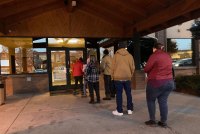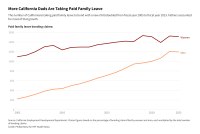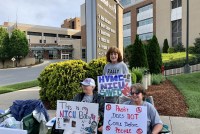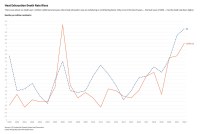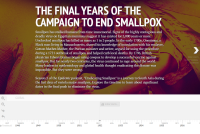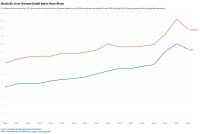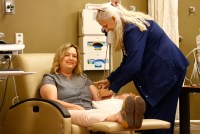Latest KFF Health News Stories
‘Forever Chemicals’ Found in Freshwater Fish, Yet Most States Don’t Warn Residents
At least 17 states have issued PFAS-related fish consumption advisories, KFF Health News found. But with no federal guidance, what is considered safe to eat varies significantly among states, most of which provide no regulation.
‘Everybody in This Community Has a Gun’: How Oakland Lost Its Grip on Gun Violence
A few years ago, Oakland won national acclaim for slashing gun-related crimes. Then the covid-19 pandemic tore through poor neighborhoods, and the murder of George Floyd fueled distrust in police. With guns readily available, violent crime has once again skyrocketed, leaving the community struggling to contain it.
‘Worse Than People Can Imagine’: Medicaid ‘Unwinding’ Breeds Chaos in States
As Medicaid programs across the nation review enrollees’ status in the wake of the pandemic, patients struggle to navigate the upheaval.
Dads Drive Growth in California’s Paid Family Leave Program
The number of men in the state taking paid family leave to bond with a new child has risen nearly 20% since the start of the pandemic.
Thousands Got Exactech Knee or Hip Replacements. Then, Patients Say, the Parts Began to Fail.
In a torrent of lawsuits, patients accuse Florida device maker Exactech of hiding knee and hip implant defects for years. The company denies the allegations.
More Schools Stock Overdose Reversal Meds, but Others Worry About Stigma
Colorado is among several states that ensure schools have access to the opioid overdose reversal medication naloxone for free or at reduced cost. But most districts hadn’t signed up by the start of the school year for a state distribution program amid stigma around the lifesaving treatment.
Más escuelas tienen el medicamento para revertir sobredosis, pero otras se preocupan por el estigma
La Administración de Salud Mental y Abuso de Sustancias federal recomienda que las escuelas, incluidas las primarias, tengan naloxona disponible, ante el aumento de las sobredosis mortales de opioides, especialmente de la potente droga fentanilo.
These Appalachia Hospitals Made Big Promises to Gain a Monopoly. They’re Failing to Deliver.
Ballad Health, the only hospital system across a large swath of Tennessee and Virginia, has fallen short of quality-of-care and charity care obligations — even as it’s sued thousands of patients for unpaid bills.
Heat-Related Deaths Are Up, and Not Just Because It’s Getting Hotter
Excessive heat contributed to 1,670 deaths nationwide last year, according to federal data — the highest rate in at least two decades. An increase in drug use and homelessness, along with hotter temperatures, were among the reasons.
5 Things to Know About the New Drug Pricing Negotiations
The Biden administration unveiled the first 10 drugs subject to price negotiations, taking a swipe at the pharmaceutical industry. But what does it mean for patients?
Exclusive: CMS Study Sabotages Efforts to Bolster Nursing Home Staffing, Advocates Say
Research commissioned by the Centers for Medicare & Medicaid Services analyzed only staffing levels below what experts have previously called ideal. Patient advocates have been pushing for more staff to improve care.
As a Union Pushes to Cap Hospital CEO Pay, It’s Accused of Playing Politics
A union is asking Los Angeles city voters to cap hospital executive pay at the U.S. president’s salary. However, hospitals accuse the union of using the proposal as political leverage, and policy experts question whether the policy, if enacted, would be workable.
Timeline: The Final Years of the Campaign to End Smallpox
Many people working in global health thought eradicating smallpox was impossible. They were wrong. Season 2 of the Epidemic podcast, “Eradicating Smallpox,” is a journey to South Asia during the last days of variola major smallpox. Explore the timeline to learn about significant dates in the final push to end the virus.
Excessive Drinking During the Pandemic Increased Alcoholic Liver Disease Death Rates
The number of Californians dying from alcoholic liver disease rose dramatically in the last decade, sped by the pandemic.
Meet the People Deciding How to Spend $50 Billion in Opioid Settlement Cash
As settlement dollars land at the state level, state councils wield significant power in determining how the windfall gets spent. And, though they will likely include the most knowledgeable voices on addiction, these panels also face concerns about conflicts of interest and other issues.
Patients Squeezed in Fight Over Who Gets to Bill for Pricey Infusion Drugs
To drive down costs, insurers are bypassing hospital system pharmacies and delivering high-priced infusion drugs, including some used in chemotherapy, via third-party pharmacies. Smarting from losing out on billing for those drugs, hospitals and clinics are trying to convince states to limit this practice, known as “white bagging.”
Need to Get Plan B or an HIV Test Online? Facebook May Know About It
Twelve of the largest drugstores in the U.S. sent shoppers’ sensitive health information to Facebook or other platforms, according to an investigation by The Markup and KFF Health News.
Opioid Settlement Payouts to Localities Made Public for First Time
KFF Health News obtained documents showing the exact dollar amounts — down to the cent — that local governments have been allocated in 2022 and 2023 to battle the ongoing opioid crisis.
Find Out How Much Opioid Settlement Cash Your Locality Received
You can use documents obtained by KFF Health News to see the exact dollar amounts that local governments in your state have been allocated in 2022 and 2023.
Biden Admin Implores States to Slow Medicaid Cuts After More Than 1M Enrollees Dropped
Secretary of Health and Human Services Xavier Becerra is asking states to make more of an effort to keep eligible Medicaid recipients enrolled. He particularly fears children losing health insurance coverage.





